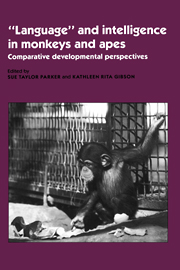Book contents
- Frontmatter
- Contents
- List of contributors
- Foreword
- Preface
- Acknowledgments
- Part I Theoretical frameworks for comparative developmental studies
- 1 Origins of comparative developmental evolutionary studies of primate mental abilities
- 2 How scientific usages reflect implicit theories: Adaptation, development, instinct, learning, cognition, and intelligence
- 3 New perspectives on instincts and intelligence: Brain size and the emergence of hierarchical mental constructional skills
- 4 Why big brains are so rare: Energy costs of intelligence and brain size in anthropoid primates
- Part II Comparative developmental perspectives on cebus intelligence
- Part III Questions regarding imitation, “language,” and cultural transmission in apes and monkeys
- Part IV Developmental perspectives on social intelligence and communication in great apes
- Part V Development of numerical and classificatory abilities in chimpanzees and other vertebrates
- Part VI Comparative developmental perspectives on ape “language”
- Index
4 - Why big brains are so rare: Energy costs of intelligence and brain size in anthropoid primates
Published online by Cambridge University Press: 11 May 2010
- Frontmatter
- Contents
- List of contributors
- Foreword
- Preface
- Acknowledgments
- Part I Theoretical frameworks for comparative developmental studies
- 1 Origins of comparative developmental evolutionary studies of primate mental abilities
- 2 How scientific usages reflect implicit theories: Adaptation, development, instinct, learning, cognition, and intelligence
- 3 New perspectives on instincts and intelligence: Brain size and the emergence of hierarchical mental constructional skills
- 4 Why big brains are so rare: Energy costs of intelligence and brain size in anthropoid primates
- Part II Comparative developmental perspectives on cebus intelligence
- Part III Questions regarding imitation, “language,” and cultural transmission in apes and monkeys
- Part IV Developmental perspectives on social intelligence and communication in great apes
- Part V Development of numerical and classificatory abilities in chimpanzees and other vertebrates
- Part VI Comparative developmental perspectives on ape “language”
- Index
Summary
Introduction
Little attention has been devoted to the question why so few species are largebrained and highly intelligent. Neglect of this question may have followed from a general resistance to the idea that intelligence arose as an adaptation through natural selection. Controversy about the evolution of human brain size and intelligence has been historic: Darwin (1871/1938) argued that intelligence is the product of selection, whereas Wallace, his codiscoverer of natural selection, argued that it is God-given (Gould, 1980; Parker, P&G1).
Although few living scholars would agree with Wallace, some biologists and anthropologists argue that the large cortex and higher intellectual abilities of the human are fortuitous by-products of other adaptations (Fiatkowski, 1986; Williams, 1966). Others avoid the issue by arguing that intelligence is a meaningless concept, or they define it in such a general way as to preclude investigation of specific adaptive values. On the other hand, those who do think that intelligence is adaptive sometimes overgeneralize the adaptive advantages of intelligence and consequently wonder why it is so rare among animal species.
In this chapter I argue that occurrences of large cortices and higher intelligence in animals are limited by the high energy costs of this functional complex, as well as by phylogenetic inertia. This argument implies, of course, that intelligence is an adaptation (or a series of adaptations), not an epiphenomenon. It also implies that intelligence is a meaningful concept that is susceptible to comparative study, that it is the product of selection and not a fortuitous by-product, and that certain phylogenetic and energy constraints explain its rarity as an adaptation.
Information
- Type
- Chapter
- Information
- 'Language' and Intelligence in Monkeys and ApesComparative Developmental Perspectives, pp. 129 - 154Publisher: Cambridge University PressPrint publication year: 1990
Accessibility standard: Unknown
Why this information is here
This section outlines the accessibility features of this content - including support for screen readers, full keyboard navigation and high-contrast display options. This may not be relevant for you.Accessibility Information
- 7
- Cited by
